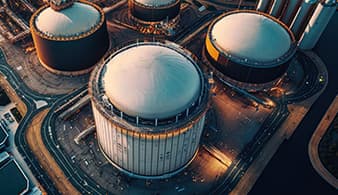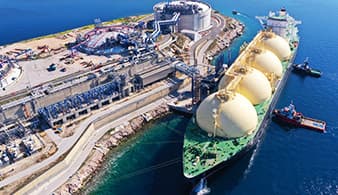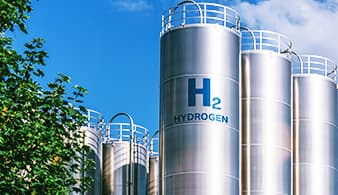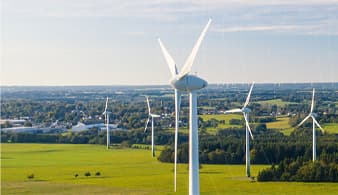Overview
Gas and power, two integral energy sources that underpin all major economic activities, are critical for businesses, which need access to reliable market information, data and prices. This enables them to make more informed decisions relating to their exposure to gas and power sectors.
Our team of market experts provides independent and reliable price assessments, indexes, market data and in-depth analysis. Our prices and market intelligence are used by energy companies, governments, banks, regulators, exchanges and many other organisations. You can benefit from our in-depth knowledge of these markets for better decision-making.
Gas and power market coverage
Argus is a leading independent provider of market intelligence to the global energy and commodity markets. Our price assessments and market intelligence are available for all major gas and power markets across the globe. Explore our coverage most relevant to your business.
Latest gas and power news
Browse the latest market-moving news on the global gas and power industry.
Colombia must rush to hit climate mark: OECD
Colombia must rush to hit climate mark: OECD
Bogota, 6 February (Argus) — Colombia will need to speed expansion of mostly non-hydropower renewable energy such as solar and wind power to achieve deeper emissions cuts and meet climate targets, the OECD said in an environmental performance review. Colombia, a member of OEDC, has relatively low greenhouse gas (GHG) emissions, at 3.7 t/capita compared with the OECD average of 10.7 t/capita. It has taken some steps towards mitigation policies, but reaching its ambitious targets will require further actions, the review found. GHG emissions grew at an average rate of 1.7pc/yr from 2005-2020. Achieving Colombia's target of a 51pc reduction in net GHG emissions will require average reductions of 5.4pc/yr, the review said. Colombia pledged to cut emissions by 51pc by 2030 compared with a business-as-usual scenario — up from a previous 20pc target set in 2015 — and to reach net-zero emissions by 2050. It accounted for 0.43pc of global GHG emissions in 2021, according to the most recent data. In September, Colombia reaffirmed the 2030 target of not exceeding 169mn t CO2 equivalent (tCO2e) in 2030, and set a new target to limit GHG emissions to 155mn-161mn tCO2e in 2035. Despite recent progress, the mitigation policies, actions and measures outlined in Colombia's nationally determined contributions — a global pledge of emissions reductions — remain insufficient to achieve net-zero emissions, the OECD said. Energy transition challenges Colombia continues to rely heavily on fossil fuels, despite having a relatively high share of renewables in its total energy supply, largely because of hydropower. Colombia ended 2025 with 21,028MW in installed power generation capacity, of which 63pc — 13,209MW — was hydropower, according to data from electricity market operator XM. Meanwhile, renewable capacity other than large hydropower reached 2,685MW in 2025, including projects in commercial operation and testing, following the commissioning of 27 new plants totaling 925MW, renewable energy association director Alexandra Hernandez said. Despite recent additions, Colombia will likely miss its target of reaching 6,000MW of renewable capacity by August and 50pc of supply by 2050, as pledged by President Gustavo Petro, Hernandez said. Investment trends remain misaligned with climate goals. Colombia attracted an average of $2.3bn/yr in clean energy investment from 2020-2023, while investment in unabated fossil fuels averaged about $6bn/yr over the same period, the OECD said. Clean energy investment accounted for just 4pc of total gross fixed capital formation in Colombia from 2020–2023, compared with a global average of 7pc. High financing costs remain a major barrier, at 13pc-14pc/yr, said Alejandro Castaneda, president of thermoelectric generators association Andeg. In addition, a 2022 tax reform also increased levies on electricity sales from renewable sources to 6pc from 1pc, aligning them with taxes on fossil fuel-fired generation. Separately, the government has expanded renewable capacity through distributed generation in more remote zones, but additional financing and new business models are needed to reduce costs, the OECD said. Other structural barriers persist. Most emissions are either not priced, priced too low or subsidized. Colombia's carbon tax, introduced at Ps15,000 ($5)/tCO2e, initially applied to fuels such as gasoline, diesel and jet fuel, as well as some industrial uses of natural gas and LPG. In 2025, the tax was extended to coal-fired power generators and coal-burning industries, rising to Ps27,399.14/tCO2e. Even so, the tax remains well below estimated climate-related costs and below carbon pricing levels in comparable economies, the OECD said. The system is also among the few globally that allows companies to use carbon offsets to meet tax obligations. The OECD further highlighted policy misalignment, noting that the updated National Energy Plan 2022–2052, which aims to expand solar and wind capacity, is not fully aligned with the emissions-reduction pathways required to meet Colombia's climate targets. "While the government has progressively increased targets for renewable energy, they lack consistency across policy documents," it concluded. By Diana Delgado Colombia electricity production % Send comments and request more information at feedback@argusmedia.com Copyright © 2026. Argus Media group . All rights reserved.
Q&A: GravitHy expects policy clarity to shape economics
Q&A: GravitHy expects policy clarity to shape economics
London, 6 February (Argus) — Argus spoke with French direct-reduced iron (DRI) firm GravitHy's chief executive Jose Naldin to explore the company's strategy, cost position and partnership plans in a rapidly shifting competitive landscape. The company is progressing with its Fos-sur-Mer plant, scheduled to begin production in 2030. Edited highlights follow: Some other green steel companies will start with natural gas and gradually introduce H2, mostly because of the price of hydrogen. Does GravitHy plan to use green H2 from the start or have a similar strategy to others? We follow a different approach. While other projects adopt gradual strategies, we are fully committed to energy independence and decarbonisation, and we believe the technology for hydrogen production and its use in DRI is already mature. Our strategy is to start with hydrogen from day one. A key advantage of our site in France is access to baseload electricity, allowing us to produce and use hydrogen on site, which is more cost effective and technically sound. We will still use some natural gas to add carbon to the product, but only for carburisation, and hydrogen will be the reducing agent from the start. This is why we will install significant electrolyser capacity. GravitHy's competitiveness depends heavily on electricity and hydrogen prices in the EU. Which EU policy tools and trade measures support your cost position most? DRI/HBI production has two main costs: energy and cost of capital. Iron ore is a global commodity, so electricity becomes the differentiator. This is why choosing France, with its competitive and decarbonised nuclear-based mix, is essential. But competitiveness also requires a level playing field. Without strong policies ensuring others follow the same decarbonisation rules, European producers are at a disadvantage. Europe must remain committed to the Green Deal and Fit for 55 because decarbonisation is not only about climate, but also about industrial resilience, sovereignty and security. The fundamentals are set out in the Clean Industrial Deal and the Steel and Metals Action Plan. What matters now is implementation. We are waiting for the Industrial Accelerator Act to detail lead market mechanisms and define green steel in a way that incentivises resilient European value chains. North Africa, particularly Algeria, is rapidly scaling low-carbon DRI. Given this growing supply of low cost, hydrogen-ready DRI/HBI in nearby markets, how does GravitHy position itself competitively while producing in a higher cost environment? Competitiveness must be analysed globally and this is where policies matter. Imported material must face the same carbon costs, and safety and quality criteria. Projects outside Europe also face rising cost of capital and natural gas prices. When you add these factors together — plus CBAM payments, transport costs and a strengthened ETS — our projections show that early in the next decade, GravitHy can be competitive against natural gas-based HBI imports. There is confusion because people compare today's HBI prices with future costs for new projects. But the market will change: free allowances will phase out, CBAM becomes financially relevant and carbon prices will likely rise. Under these conditions, our modelling shows competitiveness around 2030. But this depends on EU policy implementation — especially the Industrial Accelerator Act and a strong ETS — to maintain clear decarbonisation incentives. Your current schedule targets commercial production in 2030, with testing beginning in 2029. Is this timeline still valid, given delays at other European decarbonisation projects? For now, yes. As engineering and procurement advance, we will confirm the dates. The timeline depends on permitting and reaching an investment decision, but it remains ambitious and achievable. It will also depend on the progress of our engineering studies and procurement strategy. Europe faces tightness in DR-grade pellet supply. Has GravitHy secured long-term pellets, and how exposed are you to fluctuations? We have already signed a contract with Rio Tinto, one of our shareholders, for high grade pellets covering part of our needs. We are in discussions with other pellet suppliers to complete our strategy. Globally, there is existing pellet capacity and numerous new projects. If all materialise, there could be tightness, but this is a bottom-up situation. For the first wave of DRI projects, supply is sufficient. And if DRI capacity expands significantly, pellet producers will react as it is an attractive market. Mining companies are flexible and investment driven. So I am less concerned than many. Our aim is long-term partnerships across all inputs and we believe our project's value strengthens this position. GravitHy has recently signed an agreement with Marcegaglia, which aligns with Marcegaglia's plan to start electric arc furnace-based flat steel production in Fos around 2028. What does this co-operation entail? Potential supply agreement or infrastructure sharing? These projects are still in development, so the goal is to build strong value chains early. Collaboration is much easier at this stage than after plants are built. GravitHy, Marcegaglia and Nucor are in the same area and there are many potential synergies: logistics, infrastructure, circular economy streams, resource use and environmental co-ordination. If you collaborate too late in heavy industry, it becomes difficult or impossible because of cost and technical constraints. The MoU is not a commercial negotiation, it is about exploring how to make development faster, more efficient, safer and more cost effective through collaboration. Are you exploring partnerships with northern European electric arc furnace/mini-mill projects? No. We remain a small but growing team focused on maximising our project in Fos. We look at northern Europe mainly to understand how we can support their decarbonisation by supplying the iron units they need, rather than forming MoUs similar to the one with Marcegaglia and Nucor. There is only so much we can do with our current size; the focus is on maximising the project in Fos. By Elif Eyuboglu Send comments and request more information at feedback@argusmedia.com Copyright © 2026. Argus Media group . All rights reserved.
Australia’s Pilbara shuts LNG, iron ore ports on storm
Australia’s Pilbara shuts LNG, iron ore ports on storm
Sydney, 6 February (Argus) — Australian port authority Pilbara Ports will clear all berths at the Ports of Ashburton, Cape Preston West, Dampier, and Varanus Island by 4pm local time (8am GMT) on 6 February, while Port Hedland will be closed by 9.30pm local time, it said today. Pilbara Ports will move ships out of the ports, which handle LNG and iron ore exports, because of the fast-developing Tropical Low 21U storm, it added. The port authority moved the export hubs into Cyclone Alert 2 earlier this week, market participants told Argus on 5 February. Tropical Low 21U is currently hovering off the coast of Western Australia's (WA) Kimberley region, according to the Australian Bureau of Meteorology (BoM). It is likely to develop into a cyclone by 8am local time on 7 February, as it moves south towards WA's iron ore-rich Pilbara region, BoM forecasts show. The weather system may pass close to Dampier early on 8 February. Producers shipped 1.4mn t of LNG out of Dampier port in December, down by 12pc on the year, and 15mn t of iron ore , up by 9pc on the year. Pilbara Ports' other export hubs handled 52mn t of iron ore in December. WA ports have faced weather disruptions before. Four cyclones lashed Pilbara in January-February 2025, pushing down producer BHP and Rio Tinto's WA iron ore sales in the first quarter of 2025. Cyclone Sean flooded a railcar dumper at Rio Tinto's East Intercourse Island (EEI) facility at Dampier on 20 January 2025, halting loadings at the site until early March. But Rio Tinto continued to move ore out of other WA facilities over that period. By Avinash Govind Send comments and request more information at feedback@argusmedia.com Copyright © 2026. Argus Media group . All rights reserved.
E15 'council' convenes without Dem. lawmakers
E15 'council' convenes without Dem. lawmakers
New York, 5 February (Argus) — A council of Republican lawmakers tasked with negotiating major changes to US fuel policy held its first meeting Tuesday evening, leaving out Democrats that had pushed for a seat at the table. The US House of Representatives last month punted on a proposal that would have allowed year-round sales of gasoline with up to 15pc ethanol (E15) and restricted how many refiners can win hardship exemptions from annual biofuel mandates. Instead, lawmakers tasked a new "rural domestic energy council" with developing policy recommendations by 15 February in the hopes that Congress will weigh legislation by 25 February. The full council met for the first time Tuesday evening, four people familiar with the matter said. The task force includes more than 20 House Republicans with a range of views on biofuel policy, but no Democrats, two of the people said. The office of House speaker Mike Johnson (R-Louisiana), who was in charge of appointing council members, did not respond to Argus' requests for comment. "My Democratic colleagues and I have been clear about the need for Democratic voices on this council — a concern leadership has so far failed to address," representative Nikki Budzinski (D-Illinois) said. "I will continue to press for real, bipartisan action that our growers deserve." Proposals to expand E15 have historically drawn bipartisan support, particularly from Midwestern lawmakers keen to help the region's farmers. Democrats could still support legislation that includes an E15 deal even if left out of negotiations this month. But some lobbyists close to the debate privately doubt that the council will reach any substantial compromise, especially after the earlier E15 proposal drew strong opposition from mid-sized oil refiners that want to maintain their ability to avoid the costly biofuel quotas. The council includes members from states with those refineries, including Gabe Evans' district (R-Colorado), where a Suncor refining complex is located, while CVR Energy and HF Sinclair have units in council co-chair Stephanie Bice's state (R-Oklahoma). Some Republican US senators that have long wanted deeper reforms to the biofuel mandate program are also skeptical of the earlier proposal, complicating any deal's chance of passage. "The federal government should not force Americans to put ethanol in their gas tanks," senator Mike Lee (R-Utah) said. "It is not good for the economy, the environment or car engines. We should not subsidize the corn industry at the expense of hardworking American families." The latest E15 proposal was developed partly by the American Petroleum Institute — an influential lobby within the Republican Party — and has won the support of larger oil refiners like Valero. Farmers' and fuel groups that support the earlier bill have urged the council to focus narrowly on improving it, rather than considering more divisive fuel market issues too. President Donald Trump, who has backed the biofuel industry with a proposal last year for record-high blend mandates, has made clear that he would sign legislation expanding E15 access. He said in an Iowa speech last month that he was optimistic Congress could strike a deal. It is unclear when the council, which includes a number of farm-state biofuel supporters too, plans to meet again. The large majority of gasoline in the US is sold as a 10pc ethanol blend. Farm advocates have pushed for over a decade to loosen summertime smog rules that forbid sales of higher blends in much of the country without emergency waivers . By Cole Martin Send comments and request more information at feedback@argusmedia.com Copyright © 2026. Argus Media group . All rights reserved.
Spotlight content
Browse the latest thought leadership produced by our global team of experts.
Explore our gas and power products
Both the natural gas and power services have a long track record of providing well researched pricing, high quality analysis and market intelligence to our clients.
Key price assessments
Argus prices are recognised by the market as trusted and reliable indicators of the real market value. Explore some of our most widely used and relevant price assessments.













